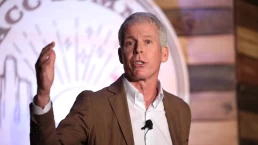Chris Wright turns a real issue into a neat talking point for the destruction of the planet.
By Gabriel Colburn, Foreign Policy in Focus
Chris Wright, who was recently confirmed as the new secretary of energy, has been famous for years as one of the more unapologetic proponents of fossil fuels. In 1992, Wright founded Pinnacle Technologies, an early leader in the hydraulic fracking business, and later made his fortune as the CEO of Liberty Energy, one of the largest oilfield service firms in North America. In 2023, he made headlines for a series of inflammatory statements disputing the science of climate change.
Now Wright has taken a different tack on climate—less outrageous, but no less dangerous. At his Senate confirmation hearing last week, Wright claimed that he didn’t deny the existence of anthropogenic climate change; he only denied that climate change warranted any reductions in fossil fuel production. To make his case, Wright spoke in abstractions about “tradeoffs” and “complicated dialogue.”
Then came the doozy: poor countries like Kenya suffered from sparse access to propane fuel, Wright said, and only fracking could deliver the low prices to make up for those shortfalls.

Wright has been quietly developing this specious argument for years: that addressing energy poverty, especially in the global south, requires untrammeled fossil fuel production, no matter the damage to the planet. In Liberty Energy’s 2024 annual report, Bettering Human Lives, Wright laid out his case for hydrocarbon extraction. “Only a billion people today enjoy the full benefits of a highly energized lifestyle,” Wright wrote, while “seven billion striv[e] to achieve the lifestyles of the more fortunate one billion.” Without access to reliable natural gas, “over two billion people still cook their daily meals and heat their homes with traditional fuels, [including] wood, dung, agricultural waste, or charcoal,” putting them at risk of acute respiratory disease from air pollution. The only remedy, according to Wright, is more fossil fuels like gas.
This weaponization of global energy poverty is so insidious because it takes a legitimate issue—inadequate access to reliable energy for billions of people around the world—and turns it into a neat talking point for the destruction of the planet. Energy insecurity is a real challenge for the global south, with over three billion people estimated to suffer from energy poverty of some kind. But so is climate change, which the World Bank projects will push up to 135 million people into poverty by 2030, and which is already fueling extreme weather, conflict, and migration, from Micronesia to the Sahel.
Recent Posts
‘Unconstitutional. Unethical. Authoritarian.’ ICE Bars Millions Of Immigrants From Bond Hearings
July 18, 2025
Take Action Now One watchdog said the new policy “seems like a blatant attempt to stop them from exercising their right to due process.”……
Americans Are Not Nearly Alarmed Enough About Climate Change
July 18, 2025
Take Action Now Americans still don’t comprehend how imminent, dangerous, and far-reaching the threat is—and journalists are partly to blame.By…
The IRS Is Building A Vast System To Share Millions Of Taxpayers’ Data With ICE
July 17, 2025
Take Action Now ProPublica has obtained the blueprint for the Trump administration’s unprecedented plan to turn over IRS records to Homeland Security…
Israel’s Sudden Assault On Syria Is Unchecked Aggression
July 17, 2025
Take Action Now Jerusalem is bombing Damascus and threatening al-Sharaa’s rule, while Washington was hoping to help the nascent government on…




